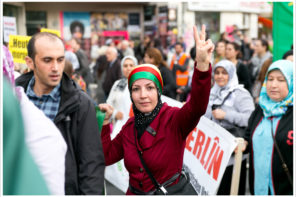On the Doorstep of Europe is a vividly written ethnography of the asylum process in Greece, “with its ethos of mystification, unpredictability, and arbitrariness” (p.217), as well as very low percentage of positive decisions. This seminal work explores the crisis (Krisi in Greek, which also refers to judgement) of governance and democracy as Greece is portrayed as the unstable locus of a myriad of problems (financial stability, its position as the EU’s external border etc).
Current alarmist depictions of ‘boat-people’ arrivals in Europe and controversial prognostics of ‘Grexit’ make Cabot’s analysis of how such “crisis narratives both assert and legitimate structural violence” (p.6) both necessary and fascinating.

In her seminal work on Burundi refugees, Malkii (1995: 16) warns against “understanding human displacement as a tragedy and looking no further”. Cabot’s insightful analysis, by examining the dramatic potential of cases, is articulated around the notion of tragedy as it “entails an encounter with that which is at once self and other, inside and outside the body politic” (p.19). In a prose both clear and elegant, Cabot’s ethnography weaves references to Aeschylos’ tragedy The Eumenides, also focused on judgement, with her examination of how service providers, bureaucrats and asylum seekers “seek to make sense of radical uncertainty, unpredictability, and even absurdity” (p.9), through practices she describes as “mythopoesis”.
The study is divided into three acts: Governance, Judgement and Citizenship.
Opening the first act, Chapter 1 begins with a judgement by the European Court of Human Rights on a case brought by an Afghan asylum seeker against Belgium and Greece and engages with the contradictory EU prerogatives of ‘security’ and ‘humanitarianism’ as well as the marginalisation of Greece within EU discourses. Amongst multiple scales of governance, she pays particular attention to NGO collaboration and describes how EU advocacy projects can reproduce marginalities, albeit “often with surprisingly productive effects” (p.40).

Photo by Jan Wellmann (flickr, CC BY-NC-ND 2.0)
Chapter 2 follows the ‘pink card’, the document each asylum seeker is supposedly entitled to, from its production throughout the protracted asylum process, exploring the police and the asylum seekers’ attempts at making sense of the document and asylum seekers’ limbo. Cabot demonstrates that “the very practices that vitalize state power also imbue the pink card with meanings and functions that reshape or even undermine state regulatory activities” (p.56). Thus, she compellingly argues for analyses of governance to focus on indeterminacies and how subjects, over which state and supranational bodies attempt to control, govern too.
Chapter 3 opens the second act (Judgement), highlighting the ambivalent responsibilities and legitimacy of NGOs in Greece, and examines tragic dilemmas within ARS cultures of assistance. After providing a sample of ARS result letters, Cabot focuses firstly on the determination of client (in)eligibility, emphasising the ethical dilemmas faced by ARS workers as well as how engagements can undermine the exclusionary aspects of eligibility practices. Secondly, she underlines the ongoing work of service provision. Whilst drawing attention to the reproduction of normative behaviour and hierarchies as clients and workers interact across complex ethical fields and generate new (mundane) socialities, she stresses the productive nature of their engagement with tragedy, which has the potential to “destabilize or exceed the hierarchies inscribed through law, governance, and dominant dispositional norms” (p.106).
Beginning with one ARS lawyer’s remark about eligibility depending on the ‘whole picture’, Chapter 4 trails the dialogical production by ARS workers and clients of ultimately unclear ‘pictures’ of trafficking victims and unaccompanied minors. In contrast with analyses that have focused on the reproduction of structures of power and violence, Cabot argues that “even as they reinforce frameworks of exclusion, aid encounters give rise to a circumscribed agency” (p.112). Underlining the reconfiguration of prevailing pictures of victimhood by both service workers and aid candidates through powerful ethnographic examples, she captivatingly demonstrates how indeterminate forms of agency have the potential to “undermine systems of exclusion from within” (p.114).
Furthering the focus on ‘social aesthetics’, Chapter 5 engages with the dialogical, performative dynamics of ‘real refugee’ recognition within the ARS. According to Cabot, such processes of recognition also constitute “a moment of redemption” (p.146) by rendering real the usually frustrating work of advocates attempting to see beyond mere good stories. Through the analysis of two cases of recognition within the ARS, Cabot illustrates the need to focus on “that which spills over from the formal space of asylum law” (p.2). She argues that “elements such as performance, language, textuality, emotion, and other much more nebulous qualities are crucial to making the ‘real’ recognizable” (p.150). However, in highlighting complex, multivocal processes of recognition, she is careful to stress that power relationships remain asymmetrical.

Photo by Jan Wellmann (flickr, CC BY-NC-ND 2.0)
The third act, Citizenship, begins in Chapter 6 . Cabot’s focus zooms out of the asylum process to examine the transformation of the political body in Athens amidst an ambivalent context marked by xenophobia and racism, as well as new intercultural encounters that had not previously been possible. Stressing the centrality of the Greek language in the construction of a Greek national narrative, she points to processes of exclusion as well as the rearticulation of the Greek ethnos. In her analysis of shifting relations and belonging, Cabot argues that “language provides a point of opening, through which new connections and lives become possible, but it also incites new racialized points of closure and exclusion” (p.185).
The last chapter focuses on the politics of exposure by recalling how two of Cabot’s informants, with no particular prior history of political engagement, were involved in attempts “to bring to light the ‘crazy situation’ in Greece and claim forms of civil membership, rights, and entitlements” (p.198). By specifically emphasising their proactive engagement, Cabot demonstrates how ‘aliens’ challenge their depiction as mere victims. She argues that political actions may mobilise dominant discourses (e.g. aesthetics of suffering) and practices (e.g. bureaucracy and documents). Yet, amidst a climate of exclusion that has become characteristic of belonging within Greece, such actions also “assert a new vision of civic entitlement: an image of shared human citizenship and human life that transcends the stranger’s position at the margins of the polis” (p.220).
Overall, the original contribution of Cabot’s analysis of knowledge, rights, bureaucracies and law lies in its sharp focus on “ghostly indeterminacies” (p.198). Her captivating work speaks to a regained interest in issues of indeterminacy within recent anthropological studies that have explored “uncertainty as a productive and investigative cue” (Cooper and Pratten 2015: 3). Rather than a bleak picture of an untenable asylum process precariously casting applicants as superfluous, the author provides a compelling and thorough examination of “a radical indeterminacy entailing both violence and agency” (p.141). Similarly to McConnachie’s (2014) study on ‘governing refugees’, Cabot further demonstrates the crucial role of political-legal anthropology in examining contested migration processes and recognising migrants’ agency.
With such a broad scope, On the Doorstep of Europe inevitably leaves some questions.
For instance, in the last act, it is not completely clear how some migrants’ desire to leave Greece is articulated with political claims of belonging. Cabot’s ‘exodus’ refers to the intimacies and engagements she examined in terms of hope, although this notion, which has recently also become prominent within anthropology, is absent from her study. Nevertheless, her exploration of the asylum system in Greece is a timely and insightful read which also provides an eloquent illustration of “the potential of ethnography to chronicle worlds yet to come” (p.x).
References:
Cooper, E. and Pratten, D. (2015) Ethnographies of Uncertainty. Basingstoke: Palgrave Macmillan.
Coutin, S. (2000) Legalizing Moves: Salvadoran Immigrants’ Struggle for US residency. Michigan: University of Michigan Press.
Feldman, G. (2012) The Migration Apparatus: Security, Labor, and Policymaking in the European Union. Stanford: Stanford University Press.
Malkii, L. (1995) Purity and Exile: Violence, Memory and National Cosmology among Hutu Refugees in Tanzania. Chicago: University of Chicago Press.
McConnachie, K. (2014) Governing Refugees: Justice, Order and Legal Pluralism. New York: Routledge.
**************
Featured image by IFRC (flickr, CC BY-NC-ND 2.0)








